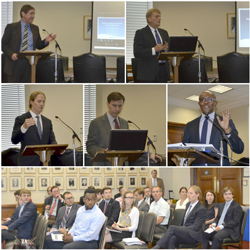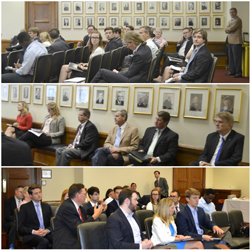

Sponsored by the Mississippi State University (MSU) and the Food and Agriculture Organization (FAO), Liaison Office for North America, a Congressional Legislative Briefing was held on 5 June 2017, in Washington, D.C.
Dr. Greg Bohach, MSU's Vice President for Agriculture, Forestry & Veterinary Medicine welcomed the attendees representing both the House of Representatives & the Senate & other stakeholders, e.g. the American Fisheries Society, the Association of American Veterinary Medical Colleges, the U.S. Agency for International Development, George Washington University's Food Institute, & the Mississippi Farm Bureau. He recognized the important partnership between the FAO and MSU.
Fisheries and aquaculture remain important sources of food, nutrition, income, and livelihoods for millions of people around the world. In 2014, production from aquaculture is about 73.8 million tonnes, worth $160.2 billion; fish and fishery products have an export value of $148 billion. About 56.6 million people are engaged in the primary sector of capture fisheries and aquaculture.
Tremendous potential for oceans and inland waters exists now, and even more so in the future, to contribute significantly to food security and adequate nutrition for a global population that is expected to reach 9.7 billion by 2050. Aquaculture is forecasted to overtake capture fisheries in 2021 and may reach 52% of total fish production in 2025.
Four eminent speakers from the University of Florida, the University of Rhode Island, MSU, and the FAO Fisheries and Aquaculture Department, each gave 10-min presentations on the future of fish as a food source.
Dr. James Anderson, Professor & Director, Institute for Sustainable Food Systems, University of Florida spoke on the future of fish as a food source. Dr. Austin Humphries, Assistant Professor, Department of Fisheries, University of Rhode Island, discussed the challenges faced in sustaining capture fisheries, many of which are currently at capacity or being overfished. Dr. Mark Lawrence, Professor & Director, Global Center for Aquatic Food Security at MSU highlighted the challenges limiting aquaculture: feed, seeds, disease outbreaks, & antimicrobial resistance. Dr. Melba Reantaso, FAO's Aquaculture Officer, discussed the way forward for aquaculture and fisheries to meet their potential to address world food security under the Blue Growth Initiative (BGI).
The USA has an important role to support BGI. Up to 90 percent of seafood consumed in the USA is imported, and about half of this is wild-caught, half is from aquaculture. This results in a large and growing annual seafood trade deficit of about $15 billion. The top five imports include shrimp, salmon, tuna, tilapia, and catfish, accounting for 76% of consumption. All except for tuna, are farmed. Aquaculture production in the USA has not kept pace with production increases in other parts of the world and now ranks 18th in total aquaculture production.
The USA can be a key player to support Blue Growth, and it can be competitive in this field because of several factors: availability of fish feed ingredients and manufacturing, excellent facilities and high competence in the fields of aquatic animal health and genetics, advanced aquaculture technologies, fisheries management, research, and development.
In closing, Dr Kent Hobet, Dean of MSU's College of Veterinary Medicine said "We are pleased to partner with FAO in the Blue Growth Initiative. We look forward to working with our colleagues from other universities to help our country achieve its potential in aquaculture and fisheries and to address issues of global food security."